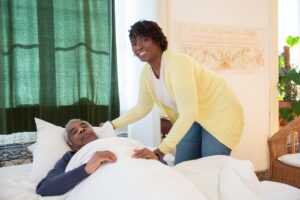This is our field, and Lucky Dove Home Care aims to be the preferred home care agency in Charleston and the other areas we serve. What is home care though and what does it cover?

Photo by Andrea Piacquadio from Pexels
Home care is simply defined as the provision of medical and assistive services for people who are either elderly or have special needs. Lucky Dove provides assistive services so that is what we will concentrate on here.
What is Home Care?
A more complete definition of home care is the care provided to a person who needs assistance and is not in a residential care service such as a nursing home. It goes by other names such as in-home care, social care, and domiciliary care, but these are less common.
The Advantages of Home Care
Comparing home care to care in group accommodations shows many positive elements in the provision of these services. It is cheaper and more flexible. It is psychologically far more comfortable. We know this and believe this.
Home care is customizable as it contains the requirements of the moment. Services can be added and removed as circumstances change and the attention of the care staff is undivided.
Assisted Daily Living
The Roper, Logan, and Tierney Model (Williams, 2017) talks about twelve activities of daily living (ADL). These are
- Maintaining a safe environment
- Communicating
- Breathing
- Eating food and drinking fluids
- Eliminating body wastes
- Personal cleansing and dressing
- Controlling body temperature
- Mobilizing
- Working and playing
- Expressing sexuality
- Sleeping
- Dying
Supporting these ADLs is the foundation of the home care services we provide.
Companion Services
Loneliness may be just about the worst thing anyone can experience. Isolation from others is soul-destroying. Care in place has the advantage of leaving people in their communities and more accessible to friends and family than they would be in clinics or nursing homes. Sometimes, though the need for companionship, is not fulfilled.
Additionally, if the needs arise, there are ways a companion can assist beyond simply being company. This includes things as basic as reminding people about medication, to taking people to appointments such as optometrists or hairdressers. Companions can help with bathing, transfer to and from wheelchairs, making coffee, and playing games. Sometimes it is as simple as having someone to watch TV with.
The more serious advantages of in-home care are the supervision of patients with conditions such as Parkinson’s and dementia as well as assisting in the prevention of falls and other injuries.
Homemaking Home Care
Some activities are more difficult than others and that can mean needing help with cleaning and laundry. We have staff who will do this with a smile. Other ways in which homemaking home care can help include assistance with pet care, cooking, and running errands

Photo by Kampus Production from Pexels
Overnight and Live-In Home Care
For some people, daily care may not always be enough particularly if a client is ill or needs help transferring from bed to wheelchair to toilet during the night. These are crucial to health and contentment and can provide a great sense of ease knowing help is always on hand. 24 hour home care is perhaps the apex service of home care.
Common Health Care
There are basic health care activities we can help with. Obviously, we don’t do things such as stoma care, but we can help with ensuring medication and supplements are taken. Making sure asthma pumps are at hand and that posture is maintained. These are simple yet vital things in caring for health.
Conclusion
In-Home care services include many possibilities for a lower cost in an environment most prefer. That it is preferred is beyond doubt, as 90% of baby boomers have expressed a preference for retiring in place. It has been shown to be more flexible and cheaper than residential care because in nursing homes and clinics fees contribute to all the facilities offered not just the ones that are needed.
There is no doubt that home care is the best option.
References
Williams, B. C. (2017). The Roper-Logan-Tierney model of nursing. Nursing2020 Critical Care, 12(1), 17–20. https://doi.org/10.1097/01.CCN.0000508630.55033.1c
